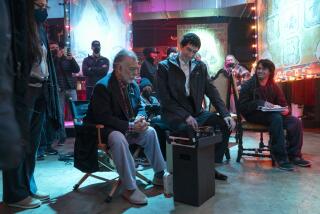007 Producers Sound Off to the Voyager Co. : The company deletes commentary tracks from its James Bond releases rather than make changes demanded by producers.
- Share via
Secret agent James Bond, defender of the free world, has lost a recent skirmish involving free speech, according to a notice inside the Voyager Co.’s new laser-disc releases of the first three 007 adventures, “Dr. No,” “From Russia With Love” and “Goldfinger.”
The note claims that an attempt has been made to “censor” filmmakers and historians who discussed production techniques and Bond personalities on a secondary audio track made for the original laser-disc releases last year. Rights holder MGM-Pathe and the Bond film producers at Eon Productions Ltd. have “forced” the Santa Monica-based laser-disc supplier to remove the secondary track, according to the advisory.
But the producers of the 30-year-old film series say they are simply enforcing a contract that gave them approval over the commentary. They are not seeking to remove it or water it down, they said, but only to correct the 185 items that they perceive to be inaccurate, insensitive, inflammatory or potentially libelous.
Rather than make the required changes, Voyager opted to remove the audio commentary and other additional visual material from its new releases.
During the more than five hours of casual commentary on the previous release of the three discs, the viewer could hear the original directors, writer and production designer point out otherwise unnoticeable elements in the films. They noted, for example, that an actor other than Sean Connery turns and shoots toward the camera in the famous opening gun-barrel sequence, and that the voices of many of the major co-stars were dubbed by other actors. Former Bond editor and director Peter Hunt recalled that Connery would not attempt anything even slightly dangerous on the set.
Voyager’s note in the new releases says that an audio cassette featuring the now-banished commentary can be ordered for an additional $10 (to cover duplication and shipping expenses). But MGM lawyers recently notified the company that it must not distribute the audio cassettes either.
Jonathan Turrel, one of four partners in Voyager, denied that the audio cassette was intended as a marketing ploy to generate more revenue. On the contrary, he said, without the extra material on the laser discs, which originally sold for $79.95 each, Voyager will likely have difficulty selling its new releases at $39.95 apiece, once MGM releases its own laser-disc versions of the same films on June 24 at $19.98 each, or in a boxed gift set for $69.98.
Turrel maintains that the issue is a matter of integrity. “We’re not into censorship, so we’re making (the complete commentary) available on tape,” he said.
Eon’s Michael Wilson, who has co-produced the most recent Bond films with his stepfather and co-creator of the series, Albert R. (Cubby) Broccoli, said that he was puzzled by Voyager’s charge of censorship.
“When somebody makes a contract with you, then how can they complain about censorship?” he asked. “If something requires our approval, then we must agree with what’s in it.”
Turell maintains that the approval process was a “very loose procedure” and that the laser discs were released because MGM had not raised any objections.
Eon employees stumbled onto the laser discs last fall, Wilson said, and Broccoli, several staff members and a lawyer immediately prepared a list of objections, which were forwarded to MGM. In a memo dated Nov. 4, MGM ordered Voyager to cease distribution of all three laser discs until they made the necessary changes.
“We don’t want to be vindictive,” Wilson said. “We just want to get it right.”
He said that many of the problems with the commentary are minor--such as the order in which names are to appear in the credits--and could have been easily corrected if Voyager had abided by its contract and received approval from MGM and Eon before releasing the laser discs last April.
Participants in the audio commentary said they believe that the Bond producers are being overly sensitive.
“They are being too picky,” said Bond director Hunt. “It sounds like a very narrow-minded point of view. They’re missing a big market.”
More to Read
The biggest entertainment stories
Get our big stories about Hollywood, film, television, music, arts, culture and more right in your inbox as soon as they publish.
You may occasionally receive promotional content from the Los Angeles Times.










